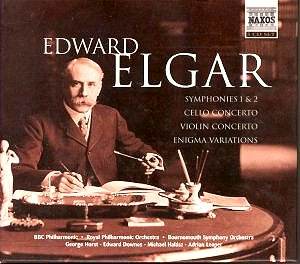It is one of the platitudes of classical record reviewing
that boxed sets of works all conducted by the same conductor are to
be avoided. While conductor X may be devastatingly effective in Mahler
7 he is for example flaccid in Mahler 9. The connoisseur is urged to
acquire piecemeal choosing the best here and there according to taste
from whichever source. Sometimes this can be done economically; more
often than not it is a game accessible only to the affluent or those
prepared to bide their time.
As if to confound the critics this box (though driven
I am sure by other imperatives) provides the indigent purchaser with
a variety of approach and the convenience and economy of a single boxed
set. This is very much a mix and match job. The unifying factors are
Elgar and that these versions derive from Naxos's digital catalogue
assembled over the 1990s.
Here we have Hurst conducting Elgar 1, Enigma,
Alassio and the Coronation March, Downes in Elgar 2, Leaper
in the major string works, Kang in the Violin Concerto and Kliegel in
the Cello Concerto. Orchestras include the Bournemouth (whose classic
Silvestri Alassio is a still a force in the land), the Polish
National Radio Orchestra in the Violin Concerto, the BBC Phil in the
two symphonies, the RPO in the Cello Concerto, the Capella Istropolitana
in the string works. The all-digital recordings were made over the period
1989 to 1995. Each of the five discs are to be had separately so if
you want some rather than all you have the best of both worlds. Naxos
could have made the collection closer to comprehensive by adding 8.553879
with Lloyd-Jones' subtle Falstaff. Anyway it can of course be
added if you wish.
Leaper draws from the Capella Istropolitana an ardently
urgent performance of the Introduction and Allegro which I can
recommend to you firmly. This has cross-grained surge and swell that
will have you on the edge of your seat. It would be a much stronger
contender if the glow on what sounds to be a large body of strings was
not so much neon glare as silvery aura. Anyway do hear it! Leaper even
makes something engaging of the Serenade!
These two symphony discs are well thought of among
most critics. However, much against my natural sympathies, I found Downes
too weighty to the point of being ponderous and stolid - not qualities
I usually associate with this brilliant creative artist. The performance
has life of course but it tracks towards the extremes mapped by Barbirolli
(remember, in the 1960s, his EMI set spread with Brucknerian generosity
across two LPs! - though I think the fourth side was blank) and the
later Boults (Boult was wonderful in his 1950s Sibelius, 1970s Howells,
Butterworth and Moeran but could be curdled and stodgy in Elgar and
sometimes in Vaughan Williams). I prefer the rip and snort of Solti's
1970s recording (now in irresistible Decca harness with the First Symphony).
On the other hand Hurst's First Symphony is given a fiery reading that
really kindles the vitality and exuberance of the work. There is something
approaching anger in his reading which at the same time does not sacrifice
the nostalgic, sturdy-steady nobilmente tread.
Hurst is also superb with the orchestra which has been
his guest home for many years (my first orchestral concert was
conducted by this dapper and temperamental man - Paignton's Festival
Theatre - an all Tchaikovsky affair!). The panache of his Enigma
and In the South rival the Beecham Sony version of the former
and Silvestri's classic EMI account of the latter with the same orchestra.
The Cello Concerto with Kliegel's close but articulate attention to
the singing line is a sturdy choice. Kang is pretty closely recorded
and he can sometimes seem hard-toned; even so this is a performance
to cherish against some very stiff competition from Zukerman (Sony -
not the later BMG), Sammons, Bean, Heifetz and even Campoli.
This is an inexpensive collection (cheaper than buying
separately). A winning choice both for the Elgar novitiate and the seasoned
Elgarian who may have previously passed by on the other side of the
street. Hearing these versions will cast new light on well-loved works
and in several cases (Symphony 1, Violin Concerto, In the South,
Introduction and Allegro and Enigma) will startle those
whose predisposed judgements have put down deep roots towards more consensually
supported readings.
Rob Barnett


